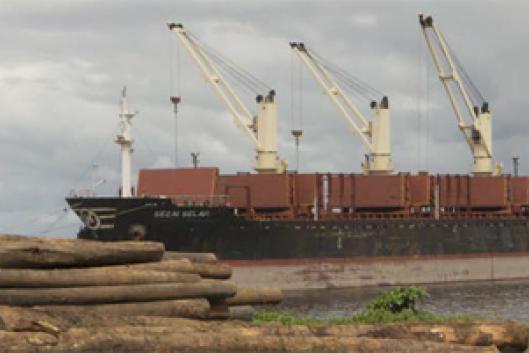Logging permits designed to promote small businesses and meet local needs are being allocated in their hundreds to industrial logging companies in Cameroon, the Democratic Republic of Congo (DRC), Ghana and Liberia.
Deforestation has been and still is a fierce scourge with both visible and hidden causes. One of the most outstanding and hoisted underlying cause of deforestation in Africa is the duo of bribery and corruption, which have long plagued the forest sector on the continent. Many efforts and much money have been focused on regulatory reform and on strengthening the rule o flaw in producer countries – but they have failed.
The new report by Global Witness “Logging in the shadows” (available athttp://www.globalwitness.org/sites/default/files/library/Shadow%20Permit%20Report
%202013%20Final_Web_0.pdf) identifies how permits designed to promote small businesses and meet local needs are being allocated in their hundreds to industrial logging companies in Cameroon, the Democratic Republic of Congo (DRC), Ghana and Liberia.
In Liberia, Atlantic Resources Ltd. and Alpha Logging & Processing Inc. − companies linked to Malaysian giant Samling Global Ltd – obtained logging rights over 10% of Liberia’s territory via “shadow permits”, despite Samling’s dubious global reputation.
Allocated in secret and subject to few controls over their operations, these “shadow permits” facilitate quick access to forests for highly lucrative, large-scale logging operations which bypass oversight by the authorities. They typically include low taxation, poor consultation with local people, little to no local processing and minimal environmental requirements.
As the report points out: “The absence of effective control over shadow permitoperations allows loggers to operate with scant regard for the environment. Environmental impact assessments are rarely, if ever, carried out and the tendency to use the same permit in multiple locations exacerbates the potential for environmental damage. The consequences in Liberia have been particularly shocking, where 40% of the country’s forests have been allocated via Private Use Permits.”
Overcoming secrecy, shadow permits have been successfully exposed in all four countries, but the information has come out long after logging has started and when it is too late for the forests and the forest people.
The report concludes that shadow permits are the product of a political economy that privileges power, patronage and vested interests above wider society and the environment. Bad behavior by self-serving and unaccountable elites undermines citizens’ confidence in government and stifles the growth of sustainable local economies. In the absence of a functioning permit system for local use, forest-dependent communities are forced to meet their timber needs illegally, further undermining the rule of law.
While corruption is identified as a crucial underlying cause of deforestation, the report recognizes that without also tackling other drivers of deforestation, like global demand for timber, Europe’s Voluntary Partnership Agreements (VPAs) and other initiatives – like the European Union Timber Regulation (EUTR), and the extension of the Lacey Act in the United States (US) – will fail to reduce deforestation.
Valuable recommendations are offered including an open, transparent, and competitive allocation process to ensure that a fair price is paid for access to resources, that EU and US importers do not assume that timber is legal because it has a permit, the need to increase efforts to provide a meaningful legal framework for community-based approaches to forest management, and to devote adequate resources to its implementation, so that forest-dependent people can enjoy proper control over their own resources.
Still, the report doesn’t say it but it would be necessary to strongly challenge the whole pattern of production, trade and consumption that fuels the logging industry as well as the bribery and corruption that pervades it.
